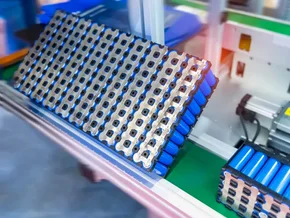Global lithium demand “shows no sign of slowing”

Interest in lithium has skyrocketed on the back of huge demand created by the battery industry. While lithium demand shows no signs of slowing down, battery technology is changing at an enormous pace.
Projects around the world are exploring alternatives to lithium, promising that a breakthrough is just around the corner. Should miners be going all in for lithium?
Here’s the latest from GlobalData’s mining experts:
“Thailand-based renewable energy company Energy Absolute announced plans in 2018 to build a 50GWh lithium-ion battery plant, which is expected to be fully completed by July 2020. India is also boosting its production of lithium batteries by investing $4bn in four lithium production plants.
“This increased demand has caused mining companies to invest heavily in lithium mining projects around the world, hoping to capitalise on a global shift to renewable technologies. Since 2017, six lithium mines have opened in Australia, and some of the world’s largest lithium mines are being developed to ensure a constant supply of the metal in the future.
“However, these investments take time and money, and while these mines are being developed battery technology is advancing in ways that may leave the lithium market behind.”
SEE ALSO:
Lithium Australia's Envirostream to supply battery metals to South Korea
Albemarle CEO says long-term lithium demand remains “robust”
Read the latest issue of Mining Global here
Other battery technologies are being developed that eschew conventional minerals entirely, using more readily-available materials to power batteries. One example of this is hydrogen fuel cells, which use an incredibly abundant (albeit volatile) gas and have an energy-to-weight ratio that is ten times greater than their lithium-ion counterparts.
However, Bo Nomark, industrial strategy executive at European innovation company InnoEnergy, told GlobalData: “The most exciting development is the high activity and buzz around development of cost/performance in batteries. In the last five years the cost of batteries for EVs has dropped by a factor of three, while power density has increased by the same factor.
“The development will not go as fast in the next five years, but we expect to see a significant improvement in cost and performance with the current technologies. Furthermore, there are new technologies under development promising even higher performance.
“The most talked about technology is solid state batteries, which have the potential to improve the cost performance of lithium batteries far beyond today’s technologies. Taking all possibilities into account, it is not unlikely that before 2030 we will see another improvement in cost and energy density with a factor of three.”
- Focus on: Lithium – ‘White Gold’ Driving the EV RevolutionSupply Chain & Operations
- Supply Chain in Mining: The Race for Critical Raw MaterialsSupply Chain & Operations
- Geothermal Engineering - UK’s first zero-carbon lithiumSustainability
- Chile to nationalise lithium industrySupply Chain & Operations






